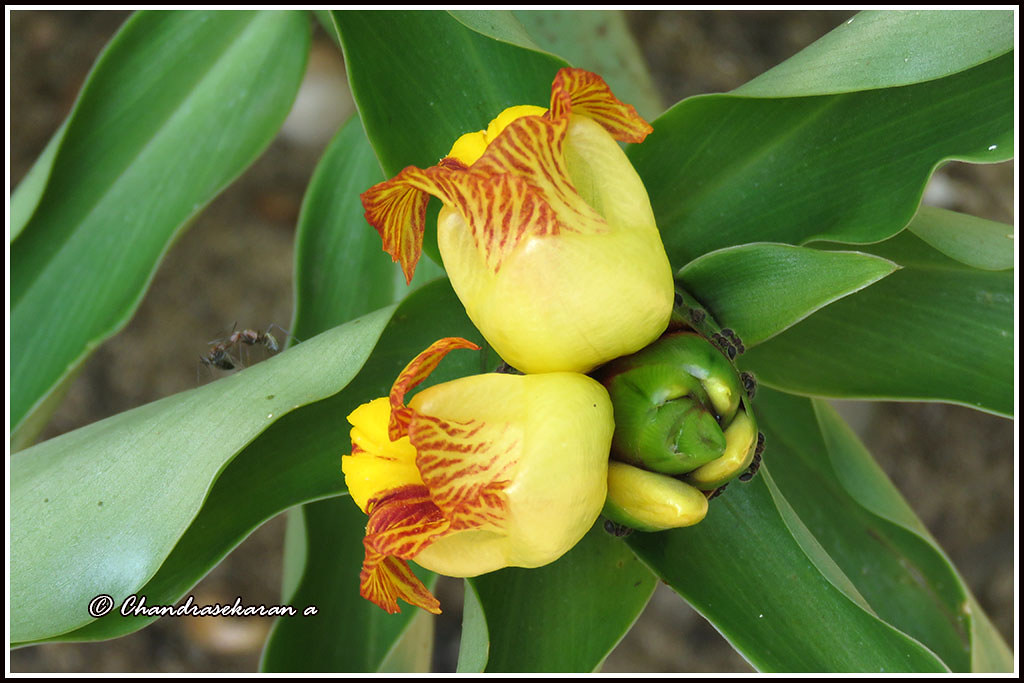 Insulin Plant (Costus igneus / Chamaecostus cuspidatus): Alternative Treatment for Diabetes
Insulin Plant (Costus igneus / Chamaecostus cuspidatus): Alternative Treatment for Diabetes
“A leaf a day keeps the diabetes away…”
In India, Insulin Plant is a common and effective remedy for diabetes, and diabetics throughout the country regularly eat 1 leaf per day to regulate glucose levels. Overall, the plant is very safe to use at these low doses for the management of diabetes, and can be a cost-effective alternative to pharmaceutical insulin. As insulin rationing has become a major (and risky) problem in the United States due to the prohibitive cost of insulin, the need for an effective, affordable, and safe insulin alternative is becoming increasingly important. Insulin rationing can lead to serious health consequences for people with diabetes, so Insulin Plant may offer diabetic patients both young and old an accessible option to maintain their health without having to worry so much about their budget.

Click here to schedule a health coaching session with us.
Insulin costs for most diabetic patients come in at around $1000 per month (on average). In stark contrast, a monthly supply of Insulin Plant costs between $25-75 per month, depending on the exact brand and type of supplement you choose, and if you have some space (and just enough time) for a small Insulin Plant on a balcony or in a backyard, the monthly cost of diabetes management could be even less.
 Click here to buy Insulin Plant Powder (Costus Igneus).
Click here to buy Insulin Plant Powder (Costus Igneus).
What is Insulin Plant and what is it good for?
Insulin Plant is otherwise known as spiral flag, fiery costus, Kostum, or spiral ginger (the plant used to be classified as a member of the Zingiberaceae / Ginger plant family), among other names. It is native to Central and South America that later made its way to India, where it became an important part of the Ayurvedic herbal medicine tradition. The plant is rich in a variety of nutrients, including many antioxidant substances, such as vitamin C, vitamin E (as alpha-tocopherol), beta-carotene/vitamin A, quercetin, and more. It also contains chromium, a particularly important mineral for diabetic patients, as well as potassium, calcium, iron, copper, zinc, and manganese.
Click here to buy the Herbal Diabetes Cures and Treatments: Diabetes Type 1, Diabetes Type 2, and Gestational Diabetes.
Besides being an effective disease management option for diabetes, Insulin Plant has also been used in the treatment of:
- Kidney stones (Insulin Plant was traditionally used in Mexico for this purpose and continues to be used for the treatment of kidney stones; both anecdotal and scientific evidence supports the use of Insulin Plant for this purpose)
- Cancer, specifically fibrosarcoma, kidney cancer, and breast cancer
- Bacterial infections
- Staphylococcus aureus
- Streptococcus lactis
- Bacillus cereus and Bacillus megaterium
- Micrococcus luteus
- Klebsiella pneumoniae
- Salmonella typhimurium
- Pseudomonas aeruginosa
- Enterobacter aerogenes
- Echerichia coli
- Shigella flexneri (Costus pictus species)
- Hyperlipidemia, especially that induced by diabetes
- Disorders of the urinary tract
- Gonorrhea and other venereal diseases
- Gas/flatulence
- Rheumatism
- Nephritis / kidney inflammation
- Urethritis / urethral inflammation
- Delayed menstruation (Insulin Plant is an emmenagogue)
- Water retention (Insulin Plant is diuretic)
- Fever
- Bronchitis (stems)
- Common cold (stems)
- Gastritis (roots)
- Liver problems (roots)
- Snakebite (roots)
- Parasitic infection (flowers)
- Vaginal infection (flowers)
- Asthma
- Skin diseases (topical application of leaves)
- Pain (topical application of the leaves)
- Disease caused by excessive alcohol use
- Candida albicans overgrowth / Yeast infection (Costus pictus species)
- Hypercholesterolemia / High cholesterol
How Insulin Plant Works to Treat Diabetes
Insulin Plant can be used in the treatment of Type 1 and Type 2 diabetes. Both of these conditions have a similar manifestation and treatment, with Type 1 being characterized by an autoimmune response where the immune system seeks out and destroys insulin producing beta-cells in the pancreas, and Type 2 being characterized by a dramatic decrease in insulin production and/or decreased cell response when insulin is released.Animal studies have shown that it is able to significantly lower blood glucose levels in cases of hyperglycemia, as well as increase glycogen levels in the liver (suggesting the proper function of insulin in the conversion of glucose to stored glycogen). Supplementation with Insulin Plant increases serum insulin levels and treats hyperlipidemia by restoring lipid levels to their normal, balanced levels. One study in particular noted that Insulin Plant may work through its ability to stimulate the secretion of insulin from the pancreas, and that Insulin Plant leaf powder can normalize both fasting and post-meal blood sugar levels.
Note that obesity-induced hyperglycemia may not respond as well to Insulin Plant, as one study demonstrated where the administration of tea from Costus spicatus, a related plant species with similar properties to Costus igneus, failed to affect insulin sensitivity after 10 weeks of administration.
Besides being able to actively normalize blood sugar and insulin levels in patients with diabetes, Insulin Plant also may help alleviate conditions associated with diabetes, such as diabetic nephropathy, fatty liver disease, and more. Insulin Plant can also help reduce the damages done by oxidation in the liver, pancreas, and kidneys and specifically increases glutathione levels in the liver, thus improving not only liver health, but also that of the gallbladder and the rest of the digestive system (including the pancreas).
Diabetic patients who choose to take Insulin Plant may experience decreased urination frequency, decreased hunger and thirst, and decreased fatigue. Some people may also experience weight loss, though this isn’t as common as the aforementioned effects. One observational study on diabetic patients in India observed that the vast majority of patients who took Insulin Plant experienced a decrease in fasting blood sugar level and also a decrease in post-meal (postprandial) blood sugar levels approximately 2 hours after eating.
The effects seen in animals have also been mirrored in studies in humans (note, though, that although there are studies in humans on the effects of Insulin Plant, that they’re difficult to find, suggesting that they’ve actually been “covered up” to prevent those in need from finding the truth about insulin plant). Below is a summary of some of the other notable effects of Insulin Plant that have been observed via scientific studies in either humans or animals:
Anticancer Effects
Methanolic extract of Insulin Plant leaf has been shown to possess 97.46% cytotoxicity against cancer cells and it can reduce tumor size. The plant’s powder successfully induced apoptosis (cell death) in breast cancer cell lines without affecting normal, healthy surrounding cells. Click here to subscribe to the Living Database!
Click here to subscribe to the Living Database!
Neuroprotective Properties
Treatment with Insulin Plant leaf was able to improve tendency toward learning and exploratory behaviors in diabetic rats. In the brain, Insulin Plant can inhibit lipid peroxidation, a process that can damage cells in the brain leading to disease or cognitive issues. A combination of Insulin Plant extract and melatonin was shown to produce antioxidant effects in the brain, restore damaged glial cells, and increase the number of astrocytes back to normal levels. Brain damage caused by hyperglycemia showed substantial positive improvement after administration of these two medicines together.Hepatoprotective
Root extracts of Insulin Plant demonstrate hepatoprotective properties via normalization of AST (aspartate aminotransferase) and ALT (alanine transaminase). ALT and AST are released into the bloodstream when liver cells are damaged, so tests of the presence of these two enzymes can indicate whether or not the liver is damaged. In cases where levels of these enzymes were higher, administration of Insulin Plant root was able to reduce their levels, suggesting that the plant may have the ability to heal and protect the liver.
Click here to learn more about the DreamLight.app, an online guided meditation and brain-entrainment tool.
Alternative Hypothyroidism Treatment
Insulin Plant not only works as a treatment for diabetes, but also for hypothyroidism. In one animal study, hypothyroid rats administered Insulin Plant leaf extracts exhibited increased T3 and T4 hormone levels and decreased thyroid-stimulating hormone levels, thus restoring thyroid parameters and acting as a successful treatment for hypothyroidism.How to Take Insulin Plant for Diabetes Management
If using the fresh leaves of the Costus igneus plant, start by chewing 2 leaves, twice daily for the first week followed by a glass of water, then reduce the dose to 1 leaf a day for the following weeks for at least one month to see the full results. The dried leaf powder of Insulin Plant may be taken at a dose of ½ of a gram or 1 gram, twice daily. Again, be sure to take the Insulin Plant for at least 1 month before assessing your condition.
 Click here to buy Pure Costus Leaf Powder.
Click here to buy Pure Costus Leaf Powder.
In whichever form you choose to take it, Insulin Plant should be taken before food. Once you drop back to the 1 leaf per day dose, the plant should be taken in the morning for best results. Insulin Plant may also be used in cases of pre-diabetes or as a preventative in cases where risk of diabetes is increased. Individuals with hyperglycemia or insulin resistance, such as women with polycystic ovarian syndrome (PCOS), may also derive benefit from Insulin Plant.
Women who are pregnant should not take Insulin Plant since, as an emmenagogue, it may stimulate uterine contractions and spontaneous abortion. Patients who continue to take oral diabetes medication should consult with a professional before starting use of Insulin Plant.

The Barefoot Healer's Guide to Autoimmune Disease, Volume 1 - BUY HERE!
Resources:










